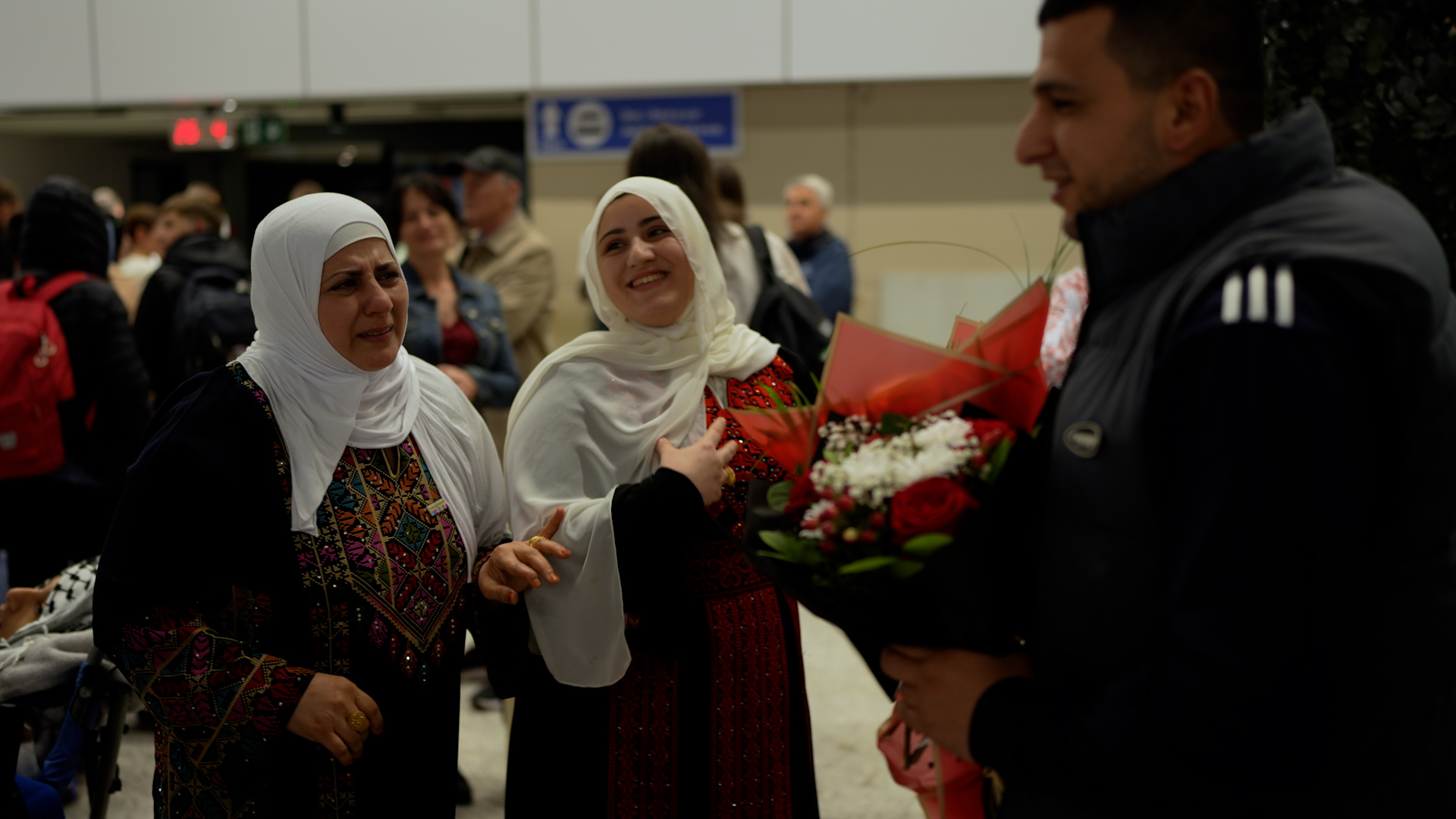This post is also available in: Bosnian
Alia keeps on smiling as she holds a bouquet of flowers wrapped in gilt-edged red paper and eagerly scans the faces of passengers as they exit the passport control area at the Sarajevo airport.
She’s looking her husband Mustafa, who is arriving from Gaza. She hasn’t seen him for 20 months, when the outbreak of the war in 2023 interrupted their wedding plans.
When she finally spots him, she waves with her hand held high as she stands with her mother, father and sister. Her mother’s eyes fill with tears as she hugs Mustafa. They have their photo taken together and then leave for their home in Sarajevo, where they have lived since fleeing Gaza.
“Thanks to God, it felt wonderful and sad at the same time,” Alia said.
“Mustafa escaped the war. People in Gaza are not safe from the war now,” she said.
When Detektor spoke to Mustafa a few days after his arrival in Sarajevo, he said he was tired and needed a long rest from everything he had been through back in Gaza.
“As happy as I am to be here in Bosnia, I am so sad about the situation in Gaza,” he said.
In the autumn of 2023, he was looking forward to his engagement and marriage to Alia, but the outbreak of the war prevented the planned celebration, for which they had already sent out invitations to family and friends.
When the violence erupted, Alia and her father, a doctor who studied in Sarajevo and lived there during the 1990s war, left Gaza at the first opportunity and went to Bosnia and Herzegovina. But Mustafa wanted to stay in Gaza to be with his own father, who has since passed away. Now he has finally managed to join his wife in Sarajevo after a long process of trying.
Although they were both in Gaza at the same time for a while, they weren’t able see each other because of the barricades that had been set up in the streets.
“No movement was allowed. He was in one neighbourhood and I was in another. When we left without Mustafa, it was really very hard,” Alia recalls.
After she left for Sarajevo, the couple had problems with keeping in touch because Wi-Fi signals in Gaza are weak. Alia and Mustafa weren’t able to talk for ten days in a row because phone lines and internet were down.
“Later on, we managed to obtain some electronic cards, so I managed to talk to her once a week. Because there wasn’t much more than that available in Gaza, I had difficulties communicating with my wife,” Mustafa said.
Each time, the wait for a call seemed like an eternity for Alia. But each new call meant that Mustafa was still alive.
“Whenever I could reach him on WhatsApp for a minute, I always heard shelling so intense that I couldn’t go on talking to him,” Alia recalls.
In Gaza, Mustafa had to walk miles to find someone with a solar-powered battery so he could charge his phone for an hour or two.
“I had to put in a lot of effort to establish communication with my wife. There was no electricity. I would wait for ten hours for my turn to charge my cellphone,” Mustafa explains.
When his phone was charged, there was then the problem of establishing a line. Electronic cards are expensive, but they were the only means of communication.
“I would make arrangements with the card owner up to seven days in advance to enable me to talk to my wife for ten minutes. It was difficult. I had to go to places that were three or four kilometres away,” Mustafa says.
During its attacks, the Israeli army destroyed most of the mobile phone masts. English language and literature student Dana Hamdan, who occasionally helps Bosnian humanitarian organisations connect with people in Gaza, says that they use SIM cards to seek an available network and establish a connection.
However, local networks have a weak signals in Gaza.
“If you want to open some websites or something, you cannot do it as it barely lets you get some notifications and you can only send a few messages,” Dana says.
There are still Internet cafes, but they also come under fire.
Ahmad Alsadeh of the Palestinian branch of the Internet Society explains that it is difficult to maintain contact with people in Gaza, not only because of the communications infrastructure or the connection, but also for security reasons.
Even before the latest attack on Gaza, people had a limited connection because there is only an outdated 2G network in Gaza. In order to get a better signal, mobile phone users have to go higher up, for example upstairs in a building.
“But this could put them in danger of being shot by Israel … You know, everything is actually destroyed, not just the communications infrastructure,” Alsadeh says.
Now Alia and Mustafa are reunited in Sarajevo, the Shaheen family are still trying to maintain communication with their relatives who stayed behind in Gaza. They hope the war will end soon and they can return home.
“Of course I would like to go back. There is nothing more beautiful than one’s homeland,” says Alia. “I really long to be in Gaza. It’s very difficult right now.”
